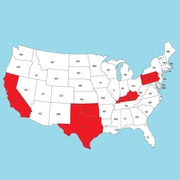
The best thing that can be said about the five "promise zones" announced by US President Obama as the War on Poverty turned 50 this week is that they probably won't do any harm. They might even do some tiny amount of good for people in the targeted areas: neighbourhoods in Los Angeles, Philadelphia, and San Antonio, and parts of southeastern Kentucky and the Choctaw Nation of Oklahoma. But they sure don't address the root causes of poverty, insofar as such things can be said to exist.
Because in an absolute sense, poverty has no cause. It has been the natural state of the bulk of humankind at almost all times and in almost all places. It is wealth that needs an explanation, hence the full title of Adam Smith's 1776 masterpiece: An Inquiry into the Nature and Causes of the Wealth of Nations. As Tom Palmer points out in the introduction to The Morality of Capitalism, "Wealth has causes, but poverty does not; poverty is what results if wealth production does not take place, whereas wealth is not what results if poverty production does not take place."
Yet we can ask why wealth production has not taken place (or not taken place as spectacularly) in certain pockets of an otherwise fabulously wealthy nation. The answer, in a word, is government. Indeed, as economist Steven Horwitz points out in a recent article, "Even a cursory look at the U.S. poverty rate shows dramatic declines in the years leading up to the late 1960s and a much smaller rate of decline since then." Competitive enterprise was doing the trick, until the War on Poverty got in the way. As Jon Stewart once quipped, we gotta stop declaring war on stuff.
What could the US government do to help those Americans who have missed the wealth train? Well, it could get out of the way. More specifically, Horwitz has three suggestions: 1) get rid of minimum-wage and occupational-licensure laws; 2) open public schools to competition; and 3) end the War on Drugs. I refer you to his excellent article for explanations of how these government programs and prohibitions have hurt the poor, and how these freedom-enhancing measures would actually help them get wealthier instead of just promising to.
Yet we can ask why wealth production has not taken place (or not taken place as spectacularly) in certain pockets of an otherwise fabulously wealthy nation. The answer, in a word, is government. Indeed, as economist Steven Horwitz points out in a recent article, "Even a cursory look at the U.S. poverty rate shows dramatic declines in the years leading up to the late 1960s and a much smaller rate of decline since then." Competitive enterprise was doing the trick, until the War on Poverty got in the way. As Jon Stewart once quipped, we gotta stop declaring war on stuff.
What could the US government do to help those Americans who have missed the wealth train? Well, it could get out of the way. More specifically, Horwitz has three suggestions: 1) get rid of minimum-wage and occupational-licensure laws; 2) open public schools to competition; and 3) end the War on Drugs. I refer you to his excellent article for explanations of how these government programs and prohibitions have hurt the poor, and how these freedom-enhancing measures would actually help them get wealthier instead of just promising to.